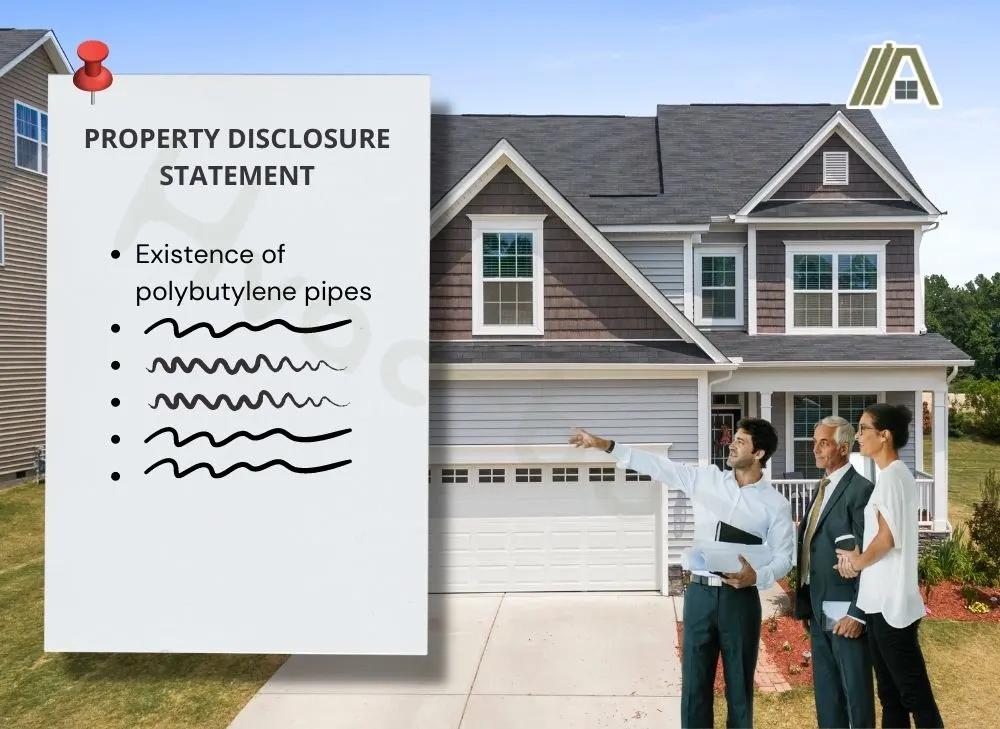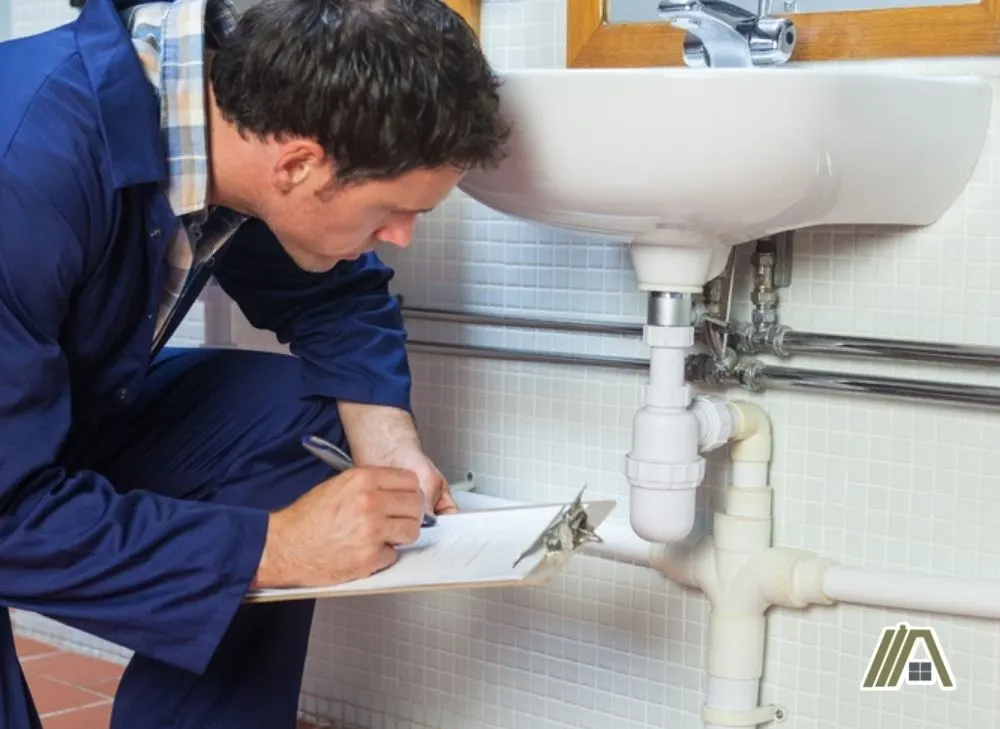Polybutylene piping is made out to be a scary threat for prospective home buyers—but with good reason! So, when it comes to buying and selling a house, poly-B pipes make a difference. As a buyer, you might be nervous about being saddled with a house that requires re-plumbing. As a seller, you might worry that the sale of your house will be compromised if the buyer learns of your polybutylene pipes.
While the rules vary slightly from state to state, most sellers will ensure potential buyers are aware if a home has polybutylene. And yes, if the home you’re trying to sell has polybutylene piping, you can still find someone to buy! Of course, these statements are oversimplified, so let’s get into some details for a better understanding.

May states require material defects to be disclosed to buyers. Polybutylene qualifies as a material defect. Many disclosure notices automatically include polybutylene disclosure. But sellers don’t always know about polybutylene pipes. There is also a precedent of "buyer beware".
States Require Notification of Material Defects
While there is no law that explicitly states polybutylene pipes must be disclosed, most states do require the disclosure of material defects on a home being sold.
Polybutylene is practically guaranteed to break down at some point, and it’s impossible to tell how soon that will be just by observing a pipe’s exterior.
So, given that polybutylene piping is a known liability, it does qualify as a material defect. Essentially, you should be made aware of its existence in your prospective home before purchasing in most cases.
Polybutylene Included in Most Disclosure Notices
Luckily, as stated, the seller must be forthcoming about the existence of polybutylene in a house, at least in most states. That means it must be explicitly stated if a home’s piping is made from polybutylene plastic.
This information will generally be found on the property’s disclosure notice, alongside any other potential defects. Sometimes, the standard disclosure notice format even has a multiple choice section for choosing what piping is present in the home, with polybutylene being one of options.

Problems With Seller Disclosure
Disclosure Requires Knowing
Unfortunately, there is an issue with having sellers disclose potential issues like polybutylene pipes—the seller has to know about a problem in order to disclose it!
There are so many potential scenarios in which a seller may not be aware that a home’s pipes are made from polybutylene.
Perhaps the seller checked the pipes themselves, and seeing that they were plastic, simply marked them off as “plastic” versus polybutylene plastic. Alternatively, they may not have been aware of the risks and liabilities related to polybutylene.
It could also be that the seller had been told when they originally bought the property that the pipes were of a different material, and never checked to confirm.
It’s even possible that the inspected pipes were not made from polybutylene, but the pipes in a different part of the home were. Not every bit of piping in a home is always made from the same material.
No matter the scenario, if the seller was not aware of the poly-B pipes, they may not be liable for failure to disclose.
Home Inspections Don’t Cover Polybutylene Pipes
Another possibility regarding a seller not knowing about polybutylene pipes is that they had a home inspection done, and simply took a clean inspection at face value.
Here’s the issue—home inspections don’t always cover the presence of polybutylene. Typically inspectors look for surface-level quality and function. This will include the HVAC, the gutters, the attic, structural integrity, and so on.
Any visible or easily accessible piping may be noted as lead or polybutylene, but an inspector will not tear open a home to see if any part of its piping could be made from poly-B.
Additionally, an inspector is actually not required to note the presence of polybutylene even if they do find it.
If a seller is relying on a clean home inspection certificate to catch all potential issues, material defects like poly pipes could still be missed.
Realtor Can Fail To Disclose
Note that the seller is not the only one who could be “at fault” here. Even if a seller knows of and discloses the existence of polybutylene piping to a realtor, the realtor may not provide potential buyers with that information.
This could be because the information happened to get lost amongst all the paperwork or other information regarding the home—mistakes do happen. However, it could also, in some cases, be because the realtor simply wanted to make a sale.
Additionally, if a seller does not want to disclose the existence of polybutylene pipes, a realtor can actually abide by that desire. However, the realtors will make the seller sign a waiver to protect themselves from potential implications alongside the seller.
“Buyer Beware”
“Buyer beware,” or “caveat emptor”, is a phrase that essentially means that the person purchasing a home should note that they are purchasing it as-is. The job of assessing whether or not a product is defective before purchase falls on the buyer, outside of an explicit guarantee.
If you purchase a home that has polybutylene pipes that were not disclosed to you, you could choose to file a suit against the seller. However, in some states, like Alabama, a seller may be able to use caveat emptor as a legal defense.
If You Are the Seller
If you are looking to sell your home and are worried about polybutylene pipes, honesty is truly the best policy!
Be sure to get a thorough inspection of the pipes done. If they are made from polybutylene, you have two main options.

Option one is to be open about the existence of polybutylene, so that potential buyers can assess if they want to take on that risk themselves. While you may need to discount the sale price to account for the liability and/or replacement the buyers will have to deal with, it’s not like you would be the first person to sell a home with poly-B pipes. You can still find a buyer!
Option two is to have the pipes replaced on your own dime. While it may take an initial chunk out of your wallet, the pipes will no longer be a liability, attracting more prospective purchasers. The value of your home should even increase on account of the updated piping.
If You Are the Buyer
If you are particularly worried about the potential of buying a home with polybutylene pipes, be sure to learn about identifying polybutylene and ask the seller or realtor for permission and assistance in taking a look at the home’s piping yourself.
This is permissible, and ideally, your realtor should do what they can to ease your mind, within reason, and let you check out various aspects of the home.
If you are being refused access or information, that’s a good warning sign for you to take your business elsewhere! If someone is trying to sell you something and is not being transparent, it’s likely they have something to hide.
Don’t forget, in addition to the practicalities of buying a house with failing pipes, it can affect important aspects of homeownership, like insurance. While agencies, like Geico, cannot speak on behalf of their insurance companies, there will definitely be some kind of insurance penalty for having these pipes.
Sources
https://cinfoshare.com/should-you-buy-a-house-with-polybutylene-pipes/
https://housecashin.com/knowledge-base/can-you-sell-a-house-with-polybutylene-pipes/
https://nonprofithomeinspections.org/polybutylene-pipes/
https://themortgagereports.com/37715/home-inspection-checklist-what-to-expect-on-inspection-day
https://www.avvo.com/legal-answers/non-disclosure-of-polybutylene-pipes-by-realtor-an-2829655.html
https://www.expresssewer.com/blog/bid/314954/how-to-inspect-plumbing-before-buying-a-home
https://www.homeinspector.org/Buyers-And-Owners/Homebuyers-Guide/FAQs-about-Home-Inspection
https://www.nolo.com/legal-encyclopedia/state-state-seller-disclosure-requirements
